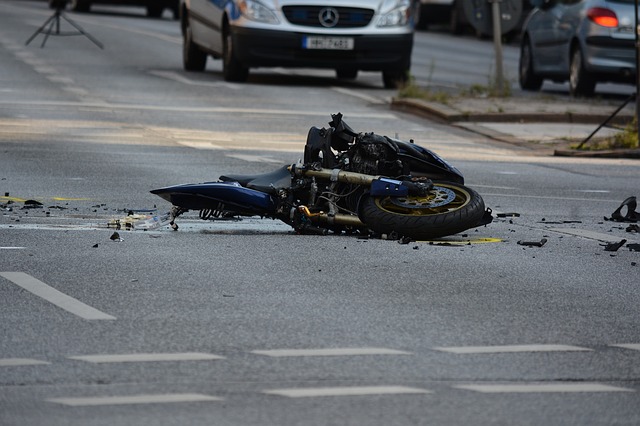Motorcycle accidents happen quickly. One second you are on your bike cruising on the freeway and the next second you find yourself on the ground and assessing your injuries.
Since you are on a motorcycle and not inside of a motor vehicle, the effects of the impact will hit you with more force than it would an individual inside of a vehicle. The attorneys at West Coast trial lawyers will tell you that your first priority is to see to your well-being, the well-being of anyone who was on a motorcycle with you, as well as anyone else who may have been injured in the accident.

Then you must start to think with a clear and logical mind. This is because the moments following an automobile accident are key and can have an impact on your rights and what you and your motorcycle injury lawyer can pursue legally in the future. With this in mind, here are a few important steps you should immediately take in the moments following a motorcycle accident.
Get Essential Contact Information
Once everyone is off the road and out of danger, you need to take the lead in gathering information from everyone involved in the crash. This information includes phone numbers, addresses, insurance information, as well as license numbers. If possible, use your cell phone and take photographs of the vehicles involved in the incident. Take a photograph of or write down the license plates of the other vehicles involved in the accident. This information may be provided to your motorcycle injury lawyer. If you’re unable to get photo evidence, jot down a description of each vehicle involved in the accident.
It’s going to take some mental clarity, but you need to keep your notes organized. If there are a number of people involved in the accident, you don’t want to mix up one insurance company for another or the contact of one driver for another. Once you have collected this information, your motorcycle personal injury attorney can help you see to it that it is used in the proper way.
Call Law Enforcement Immediately
Do not assume that someone else has already called the police. Dial 911 and get law enforcement to the scene of the accident as soon as you possibly can. If there is any property damage in excess of $500, you will need to have a police report. Make sure that everyone who is injured gets the needed medical attention.
It can be tempting to walk away from an accident without getting a police report, especially if it seems like everything is okay in the moment of the accident. The problem with that is that if in the future you realize that you are injured or that your bike was damaged, you will need to have a police report to back up your claim. Your motorcycle personal injury attorney may use this police report when fighting for your rights.
Informing law enforcement about an accident is a key brick in building your case. In addition to the police report, the officers are going to keep their own records, which can be used as a reference later. Take down the responding officer’s badge number and name. This will help your personal injury attorney follow-up with any additional information that needs to be collected.
Be Aware of What’s Going on around You
Depending on how severely you are injured in the accident, it may be difficult for you to take note of everything going on. But if possible, try to be aware of pertinent information pertaining to the accident. Where did it happen? When did happen? How did it happen?
Focus on things like speed limits, road conditions, the location of the accident, what the weather was like when the accident occurred, the lighting conditions on the road, and what direction the vehicles involved in the accident were traveling from. If possible, take notes that include the name of the nearest intersection and the nearest mile marker. All of this will make it possible for you to come back later and take photographs and document the scene. Your motorcycle accident attorney may be able to use this information when helping build a civil case.
Talk to Eyewitnesses
Eyewitnesses to an event play an important role in legal matters. If you can, take the time to talk to everyone who actually witnessed the accident. Use your phone to record their observations. If they don’t want to be recorded, then write their observations down on a piece of paper.
Don’t trust your memory. Because of injuries sustained during the accident, your memory may not be as clear in the upcoming hours or days. Time causes memories to fade. Certain details that eyewitnesses recall in the moment of the accident may be difficult for them to remember later. So try to get as much eyewitness evidence recorded so that your motorcycle accident attorney can use it in the future.
You Do Not Know Who Is at Fault
It’s human nature for two people who collide with each other to want to start apologizing right away. It’s what “good people” do. However, when there is a motorcycle accident, the last thing that you want to do is apologize or admit fault. In many cases the cause of the accident is unclear. You may think it’s your fault, but once the accident scene is investigated, it becomes clear that another party is at fault. Be careful about what you say, especially to law enforcement. Any statement you gave at the accident scene can have serious consequences down the road.
Talk to Your Insurance Company and Your Lawyer
Give your insurance company all of the information that you collected while speaking to eyewitnesses as well as documenting the accident scene. When you speak to your insurer, do not admit fault. Whatever your insurer writes down becomes a document that can be referred to during any legal proceedings.
Finally, if you or someone you love is a victim of a motorcycle accident, contact your personal injury attorney immediately. Their experience dealing with motorcycle accidents can make the difference in the outcome of your case.
Being in a motorcycle accident is a jarring experience. Depending on how seriously you are injured, you may feel that this injury is going to permanently change your life for the worse. Thankfully, West Coast trial lawyers can be there to help you to get the compensation you may be due after an accident with the goal of helping you get your life back on track.



